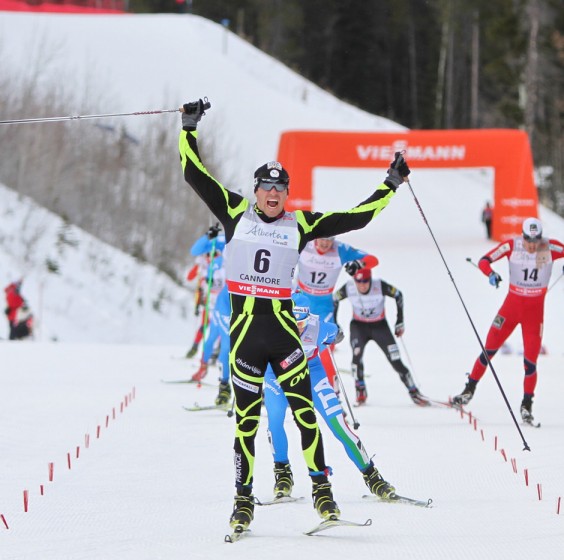
Coverage of the Alberta World Cup made possible through the generous support of Travel Alberta and Tourism Canmore.
CANMORE, Alberta — Three days ago Maurice Manificat of France was dragging his black-and-fluorescent yellow-clad body up the famed Canmore “wall,” a death march of a ski race, a French bumblebee without buzz.
Manificat, seeded fourth in that 15 kilometer mass start, struggled to 44th place, but Sunday brought another race and another chance, and the Frenchman had his wings back, flying by Italian Roland Clara in the homestretch to claim victory in the 30 k skiathlon.
Challenging Canmore courses and an aggressive field ensured that this race would not play out as so many men’s World Cup races are wont to do — a sprint to the line by a herd of more than 20 skiers.
Four 3.75-k classic loops up the steepest climbs were followed by the same number of skate loops, on a relatively more rolling course.
The pack stayed tight for the first loop but the second time up the massive climbs, the field slowly began to string out, an inexorable process that would continue for the bulk of the race.
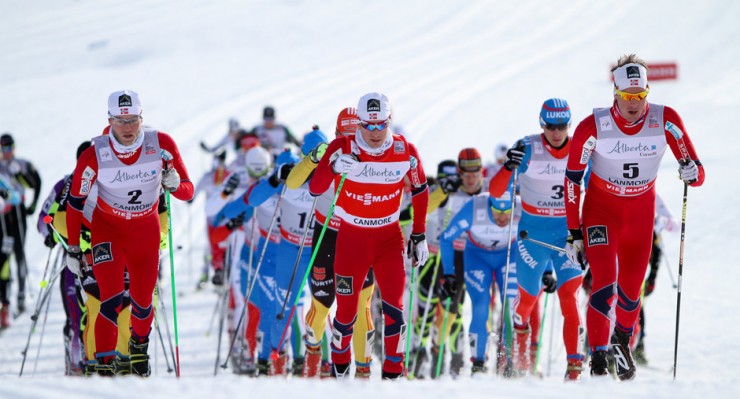
Each time through the hills, another handful of skiers slipped off the back. At lap one, the pack was 62 strong. The second time through it was down to 36. Another 3.75 k and it was 32. Halfway through the race, only 26 remained in the hunt.
While the lead changed frequently, several numbers remained consistently at the front — Sjur Roethe (NOR), who entered the race wearing the red bib of the distance World Cup leader; Jens Filbrich, the veteran German; gangly Russian Evgeny Belov; the ancient Italian Giorgio Di Centa; Ivan Babikov, the Canadian bulldog; and the upstart of the bunch, American Noah Hoffman.
Hoffman never dropped far from the back, and was often in the top five, taking turns leading. In the classic portion he was aided by skis that he said “might have been the fastest in the field.”
And while he was “gliding up to the front without really being able to help it,” he entered the day planning to ski at the front of the pack.
“I’m more comfortable skiing in the top five, especially with the yo-yo effect you get in the back,” Hoffman said.
He was looking to be aggressive, and stay forward where he could relax.
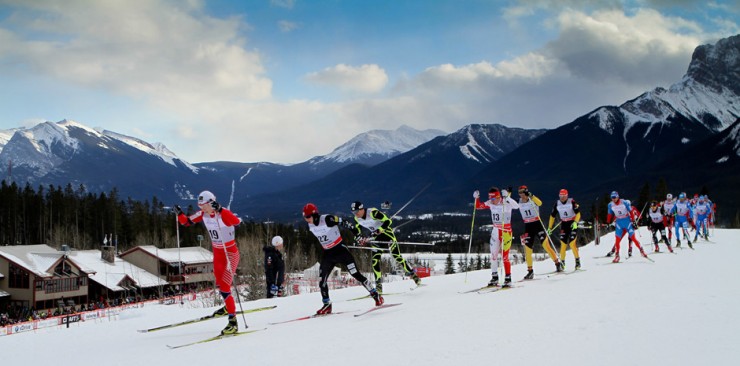
While the pace was high, Belov and countryman Alexander Bessmertnykh were not content to let the steady attrition continue. On the fourth ascent of the classic loop, the pair attacked, quickly pulling away to a nearly 20-second lead.
At the transition the lead was down to 12 seconds, and Babikov, switching to his preferred technique, flew through the transition, bridging the gap over the next 200 meters.
With the new blood in the break, the lead increased slightly to 15 seconds before stabilizing. Hoffman said he wasn’t confident that the trio would come back, but Tobias Angerer (GER) who ended up in fourth, laughed when asked about the bold attempt to open up the race.
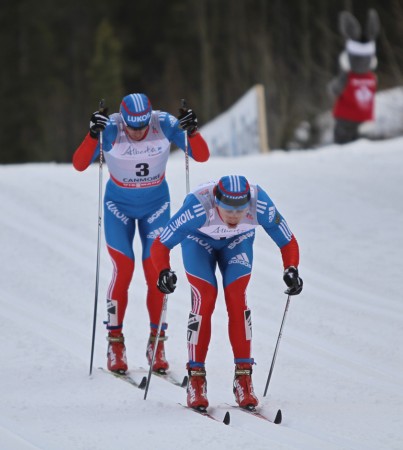
“It was no problem,” Angerer said, adding that a lead of 15 seconds is not enough to pose a threat. “We had everything under control with the Norwegians.”
There was no explicit communication among the chasers, but Angerer said there was a clear feeling that “there was no danger.”
Norway led the charge with Petter Eliassen, Chris Andre Jespersen and Roethe, joined by Hoffman, doing the work. The gap slowly closed down, though Hoffman felt that it had less to do with any increase in speed by the pack and was a more a function of the leaders tiring.
At the end of the second skate lap, coming down into the stadium, Bessmertnykh crashed on the sweeping right-hand turn, leaving Babikov and Belov to try to hold the gap.
Babikov, a native Russian, had been in communication with Belov and Bessmertnykh as the three worked together to pull away, coordinating efforts.
After feeling “so good” in the classic, he pushed hard in the skate, but ran out of legs after two laps. The chasers closed the final distance early in the third loop, absorbing the two leaders.
Bessmertnykh recovered quickly from his mishap, joining the main group as it came by, but whether he was spent from his early attack, or somehow hindered from the fall, he could not hang, slipping back through the field to finish 29th. Babikov settled back in, looking “to save some energy for the finish,” and recover from the push.
“I used too much at the beginning of the skating leg,” he said, adding that he was “proud” of his classic leg, usually a weakness.
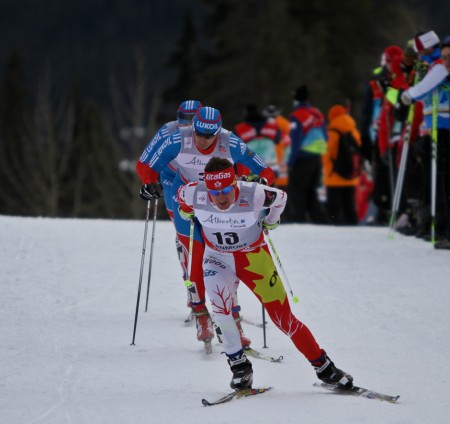
“That’s good for World Champs, Sochi, [site of the 2014 Olympics]. We have duathlon there, and maybe one of those days I’ll have the legs and be able to take them away,” Babikov said.
Known for his tenacity, Babikov hung tough, but he was drained from his attack. A weak sprinter, he did not factor into the fight for the podium. He did finish a solid 12th, however, coming across the line in the main group.
“We wanted Ivan to attack early,” Canadian head coach Justin Wadsworth said. But they “didn’t want it to be that early.”
The breakaway defeated, the race continued to play out with less drama for the next lap. By the 20-kilometer mark, the pack was down to 18 skiers, a group that would remain in relative contact until the final climbs.
Hoffman continued to sit toward the front, but was not the only North American battling for position. Both teammate Kris Freeman and Canadian Graham Nishikawa were present, though generally toward the tail end.
Freeman was right where he wanted to be early on as he worked “to conserve as much energy as possible in the classic,” so he could “really jam in the skate.” In contrast to Hoffman, he would rather be in the slipstream than up front.
“Hoff doesn’t like skiing in groups so he goes to the front, and I’d much rather be sucked along in the draft,” Freeman explained.
Seeing Freeman in the top 20 is hardly out of the ordinary, but in recent years he has struggled to do more than just hold on. However, U.S. Ski Team (USST) coach Matt Whitcomb was unsurprised to see Freeman in the mix, saying that the veteran showed up in Canmore with “a totally different energy … you could tell he was ready to pop some races here.”
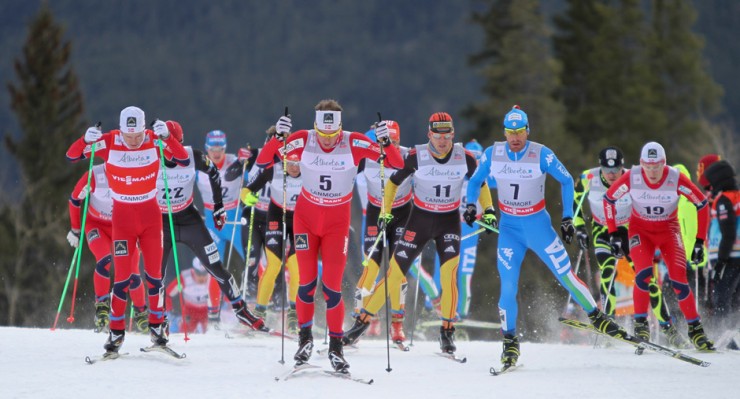
Graham Nishikawa’s performance, on the other hand, was most certainly unexpected, even to himself. While he has cracked the top 30 before, he has never hung with the pack in a World Cup mass start.
“I kept surprising myself, like oh, made another lap, made another lap,” the Alberta World Cup Academy and Canadian Senior Development skier said. “I was just trying to stay really relaxed and in contact with the leaders and just take one lap at a time.”
And as the race wound toward its conclusion, he put his “head down and tried to hang in there as long as possible.”
He crossed in 15th, not losing contact until the final kilometer, and finished just ahead of the likes of Jespersen, Martin Johsnrud Sundby (NOR), and Evgeniy Dementiev (RUS).
“It was unbelievable,” he said. “I had a career best day in my hometown.”
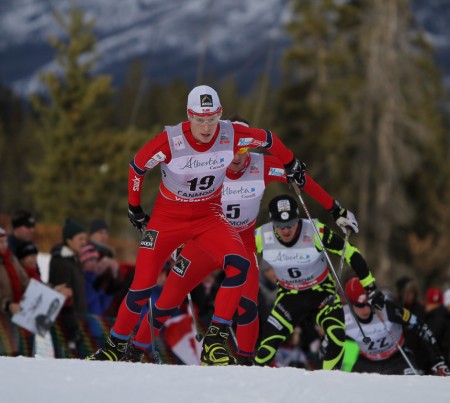
Back up at the front, the intensity increased as the skiers headed out for the final lap. Eliassen took a chance, pushing on the first climbs out of the stadium, opening a small five-meter gap. He couldn’t get away, with Hoffman doing the initial work of responding.
“It was time to go so if no one else was, I was gonna try to pick up the pace and get him back on,” Hoffman said.
He did pay a price, and “suffered a little bit as guys came around,” but he did not slip far.
During all the excitement of attacks and responses, Clara waited patiently, opting to stay back and catch a ride.
“Half of the race was, for me, fast training,” the Italian explained after earning his fourth career World Cup podium. “Only the last lap was hard.”
On the last climb out on the loop, Clara finally played his hand, attacking hard. Only Manificat was able to respond, though Roethe made a valiant effort. The Frenchman said that the pace on the last lap was very high, with “everybody wanting to go ahead.”
The wide Canmore trails made passing easy, however, and though he was uncertain if he wanted to attack himself, when Clara went, Manificat followed, cognizant of the long descents ahead and the need to get clear.
“I tried to push and I see that only Maurice can follow me,” Clara said. “In the downhill he passed me, and I stayed on his back and we made a really good race together in the last k.”
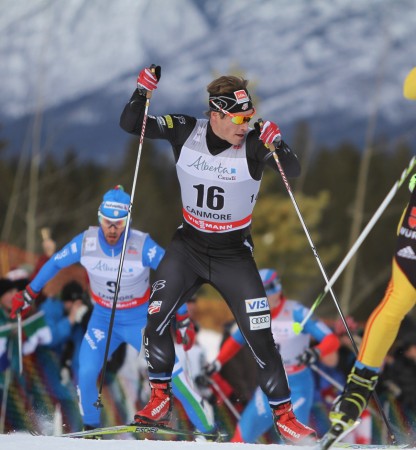
Clara made one more go of breaking away on the final short hill. But at only “50 or 60 meters” he said it wasn’t long enough, and he couldn’t get free.
The pair swooped into the stadium, Manificat riding the draft, before stepping out and powering by. At that point the outcome was not in doubt. Manificat is the stronger sprinter, and had the slingshot effect.
“The last few hundred meters to the finish line I come back on him, and then I push,” Manificat said. “It was only in the head, you are so crazy and you know you can win.”
Clara was not at all disappointed with the outcome, giving Manificat his due.
“It’s perfect to find again the victory,” Manificat said. “It’s totally different from a simple podium. Every year I make podium but victory is very good to find again.”
His last win came back in 2010 in Lahti, Finland, also in the 30 k skiathlon.
Roethe couldn’t quite keep contact, but he did ski clear of the now strung-out field to earn the final podium position and retain the red distance bib. He was followed across the line by Angerer, who couldn’t get clear at the top of the course to respond to the attack.
“I was behind some skiers and they were too slow for me,” Angerer said. “There I lost the race.
Hoffman crossed just seconds later in eighth place, easily a career best.
“In order to win one of these I probably do need to be able to break the field a little because I’m probably not gonna win this final sprint,” Hoffman said. “But today I’m happy to be able to hold the position and stay in the top ten.”
He added that he was in no place to be part of the final break, saying “I was hurting up there.”
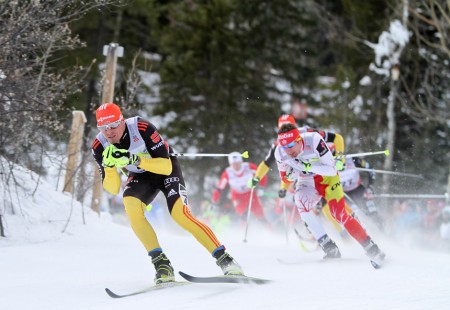
He didn’t lose any ground in the final 200 meters, an accomplishment in itself.
“Hoff holding his ground in a sprint? What?” Whitcomb said. “It was absolutely amazing. It is a new skier out there.”
Freeman had his own strong finish, picking up a spot in the homestretch when he outlunged DiCenta at the line.
Hoffman was realistic about his result, recognizing a number of top distance skiers were not present, but he recognized the quality of his effort regardless.
“Not all World Cup fields are created equal…but there are some amazing skiers here…so I’m psyched to be able to ski with them in a 30 k,” Hoffman said.
“Eighth is sweet, hopefully there’s more to come in the future but I’m psyched right now,” he concluded.
— Alex Matthews and Gerry Furseth contributed reporting
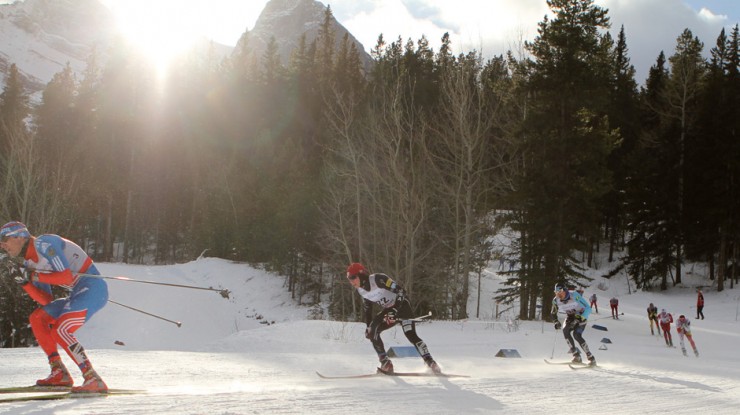

Alex Kochon
Alex Kochon (alexkochon@gmail.com) is a former FasterSkier editor and roving reporter who never really lost touch with the nordic scene. A freelance writer, editor, and outdoor-loving mom of two, she lives in northeastern New York and enjoys adventuring in the Adirondacks. She shares her passion for sports and recreation as the co-founder of "Ride On! Mountain Bike Trail Guide" and a sales and content contributor at Curated.com. When she's not skiing or chasing her kids around, Alex assists authors as a production and marketing coordinator for iPub Global Connection.



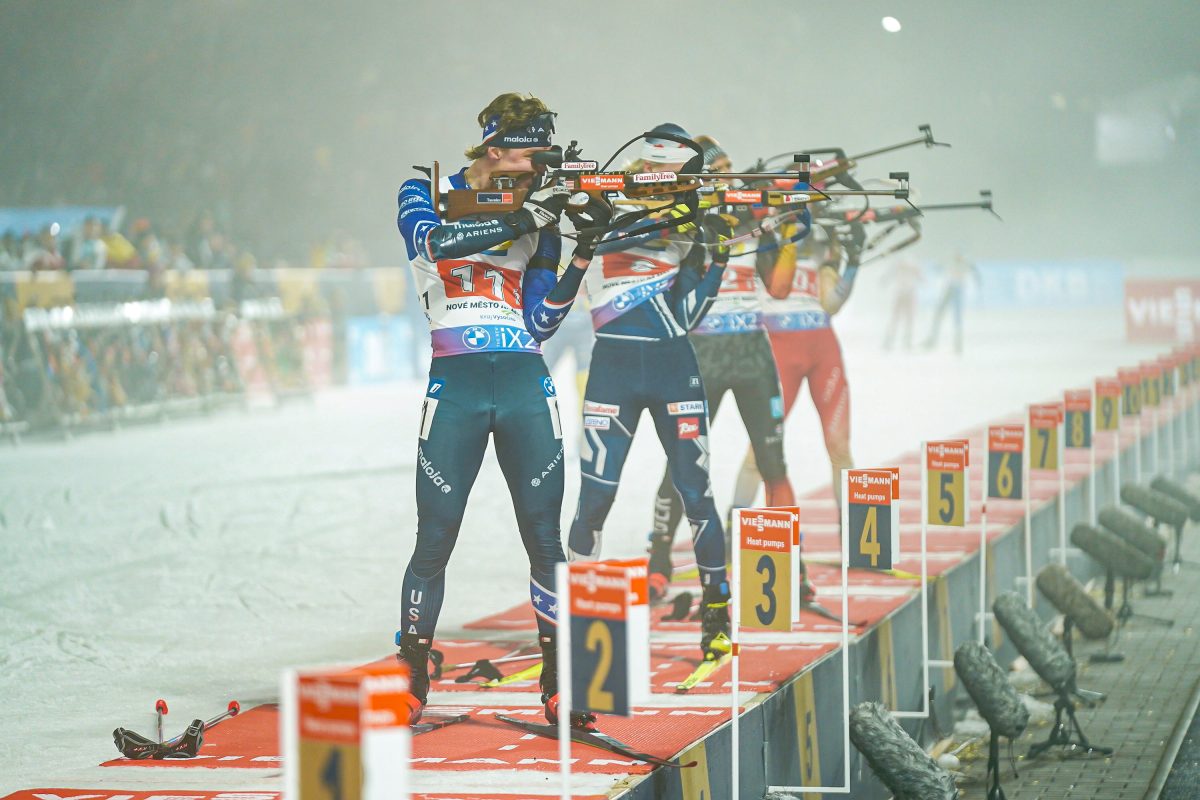
2 comments
chadsalmela
December 16, 2012 at 11:10 pm
Hoff was the performance of the day. Almost a tie with Burke, but Burke has been there before, so Hoff gets the edge. Great day of US Men’s Nordic.
nyctvt
December 17, 2012 at 9:26 am
Hoffman had an amazing race, congratulations.